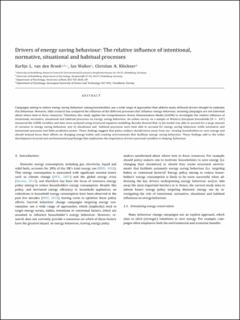| dc.contributor.author | van den Broek, Karlijn L | |
| dc.contributor.author | Walker, Ian | |
| dc.contributor.author | Kløckner, Christian | |
| dc.date.accessioned | 2020-03-24T17:12:55Z | |
| dc.date.available | 2020-03-24T17:12:55Z | |
| dc.date.created | 2019-12-19T15:29:55Z | |
| dc.date.issued | 2019 | |
| dc.identifier.citation | Energy Policy. 2019, 132 811-819. | en_US |
| dc.identifier.issn | 0301-4215 | |
| dc.identifier.uri | https://hdl.handle.net/11250/2648440 | |
| dc.description.abstract | Campaigns aiming to induce energy saving behaviour among householders use a wide range of approaches that address many different drivers thought to underpin this behaviour. However, little research has compared the influence of the different processes that influence energy behaviour, meaning campaigns are not informed about where best to focus resources. Therefore, this study applies the Comprehensive Action Determination Model (CADM) to investigate the relative influence of intentional, normative, situational and habitual processes on energy saving behaviour. An online survey on a sample of Western European households (N = 247) measured the CADM variables and data were analysed using structural equation modelling. Results showed that 1) the model was able to account for a large amount of variance in energy saving behaviour and 2) situational and habitual processes were best able to account for energy saving behaviour while normative and intentional processes had little predictive power. These findings suggest that policy makers should move away from motivating householders to save energy and should instead focus their efforts on changing energy habits and creating environments that facilitate energy saving behaviour. These findings add to the wider development in social and environmental psychology that emphasizes the importance of extra-personal variables in shaping behaviour. | en_US |
| dc.language.iso | eng | en_US |
| dc.publisher | Elsevier | en_US |
| dc.rights | Attribution-NonCommercial-NoDerivatives 4.0 Internasjonal | * |
| dc.rights.uri | http://creativecommons.org/licenses/by-nc-nd/4.0/deed.no | * |
| dc.title | Drivers of energy saving behaviour: The relative influence of intentional, normative, situational and habitual processes | en_US |
| dc.type | Peer reviewed | en_US |
| dc.type | Journal article | en_US |
| dc.description.version | acceptedVersion | en_US |
| dc.source.pagenumber | 811-819 | en_US |
| dc.source.volume | 132 | en_US |
| dc.source.journal | Energy Policy | en_US |
| dc.identifier.doi | 10.1016/j.enpol.2019.06.048 | |
| dc.identifier.cristin | 1763095 | |
| dc.description.localcode | © 2019. This is the authors’ accepted and refereed manuscript to the article. Locked until 26 June 2021 due to copyright restrictions. This manuscript version is made available under the CC-BY-NC-ND 4.0 license http://creativecommons.org/licenses/by-nc-nd/4.0/ | en_US |
| cristin.unitcode | 194,67,40,0 | |
| cristin.unitname | Institutt for psykologi | |
| cristin.ispublished | true | |
| cristin.fulltext | original | |
| cristin.qualitycode | 1 | |

